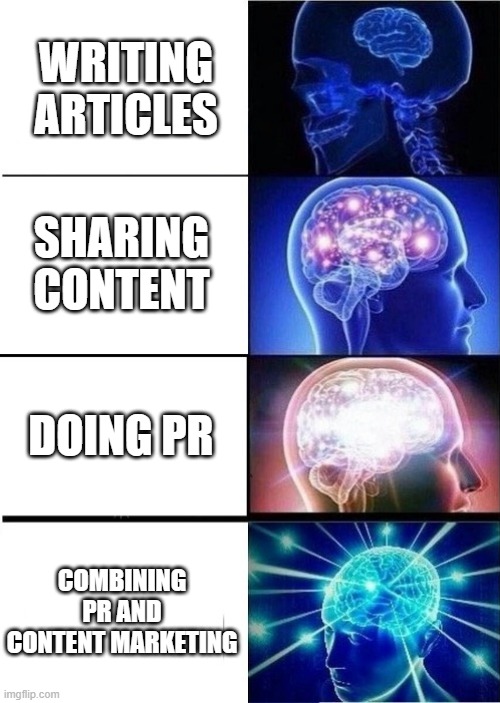
9th July 2021
How Does PR Support Content Marketing?
When you’re working on content and SEO marketing, especially endeavours such as link building strategies, it may feel like you’re crossing the line into the world of PR. So how exactly does PR support content marketing, where does one discipline end and another begin, and how can we work together to create great marketing strategies?
What is Content Marketing?
Content marketing is the creation and distribution of valuable and relevant content across your online channels. Content may be placed on your website, external sites, social media, emails and more, and it should entertain, inspire, educate or convince - all with the ultimate goal of driving conversions, revenue or growth for your business.
Read our blog post "What Is Content Marketing?" for a more detailed explanation.
If you’ve been creating content for a while, you may have realised that it isn’t enough to just create the content – you also need to promote it so that you get as much value from it as possible. However, as everyone can now create content online, it’s become increasingly difficult to stand out by creating great content and showing it to the right people. This is where content marketing and PR can begin to overlap and where they can benefit each other.
What is PR?
While content marketing is firmly in SilverDisc’s territory, PR is a little further outside our wheelhouse – but certainly not too far away. Public Relations Society of America (PRSA) provides the following definition:
"Public relations is a strategic communication process that builds mutually beneficial relationships between organizations and their publics."
PR professionals could be defined as storytellers because they show a business's offerings, news or reputation in a positive light. PR communications may take place through paid or unpaid media both online and offline, such as social media, speaking engagements, press releases and more. PR professionals use their connections and communication skills to spread news about your brand, encouraging conversation and even promoting you as a thought leader within your industry. Plus, there is an element of damage-control involved in PR, for example, if something negative happens that a company is involved in and work needs to be done to mitigate any reputation damage.
PR can be proactive - sharing your content with the public - or reactive - responding to journalists' needs for content. In this digital age, PR is by no means restricted to traditional media, and PR agencies are often involved in various aspects of creating and distributing content online. Good PR will help you to increase your brand visibility and build trust with your customers, as well as influencers, editors and journalists - leading to long-lasting, mutually beneficial relationships.
How Do PR and Content Marketing Complement Each Other?
Look at the explanation of PR above - it's all about storytelling, brand awareness, trust and communication. The same could be said about content marketing. The place where these two disciplines particularly intersect is in link building. Of course, this is primarily an SEO venture – the act of creating content on your website and reaching out to external sites to request they link to your page, in the hopes this will improve your SEO (providing the external site in question is in good standing and has a high domain authority). But it is also part of content marketing because you’re generating content and trying to market it through other websites.
An example of a link building strategy is that once you have your content up on your site, you look for websites you’d like to get backlinks from (or maybe the other way around – you may already have a website in mind and therefore write content you think will interest that particular prospect). This reaching out to external sites is where things head a little into PR territory. An important part of link building is contacting the website owners – likely via email – to tell them about your business, website and the particular page in question, and asking them to add a link to the page onto their website. How will you succeed in creating the right content, finding the people who will be interested in it, and convincing them to help you promote your offering? These are all PR skills that intersect with content marketing and SEO.
Find out more about link building in our blog posts “An Introduction To SEO Links” and “How to Evaluate an SEO Link Building Opportunity”.
Another part of being in a PR role is keeping up with industry trends. Content marketers have lots of creative ideas, but not as much knowledge about the industry as someone who works in it every day. PR agencies that work within a niche will have great insights into what’s going on in the market right now, while a content marketer may be more focused on what customers are looking for and how to appeal to the target audience. All of the skills required for PR can help inform content strategy and combine with the creativity of content marketers to produce effective articles, videos, infographics and more, and distribute them widely.
In summary, a PR professional might reach out to a journalist with a story the journalist can write about. A content marketer will already have written that story but it might not be widely distributed. Put these two experts together, and they can approach journalists with ready-made stories – great content distributed far and wide to spread the word about your brand.
How to Combine the Power of PR and Content Marketing
Whether PR, content and marketing are in-house or with agencies, we're all working together, sharing a common goal and doing our best for the business. With that in mind, here are a few practical ways you can get the most out of your PR and content marketing by working together:
1. Set up a culture and process for sharing ideas and insights
When we share our thoughts with each other, good ideas can snowball into great ones. But to make sure everyone is sharing, it's a good idea to set up processes that facilitate rich discussion. This may be in the form of setting up regular meetings or phone calls, or having a shared online space where you can write down your ideas or plan and organise projects.
2. Play to everyone's strengths
While some people may be brilliant writers, they may not have the edge on distributing content, and vice versa. It's important to play to everyone's strengths so that you have the best content creators working on the content - whether that's written, video, audio or graphic - and your best PR professionals using their connections, persuasion and industry knowledge to spread the word. This can help you to create content that drives revenue and reach a new, wider audience.
3. Communicate with each other
If two agencies or departments are working separately, this could be a recipe for missed opportunities. What if PR is working on a campaign the content team isn’t aware of, but could have helped write content for? Or if the content team has created an article for a time-sensitive campaign, but doesn’t let PR know so they can help with distribution? If you use both content and PR teams, do you have them working together or on separate projects, and why? Are there projects that need PR and not content marketing, or would every project benefit from having both experts involved? It’s something to think about. Remember: you don’t know what you don’t know. Both teams may have insights the other never would have considered.
4. Work to understand the value of each discipline
PR and content marketing take different approaches to the same goals and have different skills - for example, a PR professional may not be well-versed in SEO and a content marketer may not have PR as a primary skillset. However, good marketing and PR teams will understand the importance of each person's role and the value they bring to the project - enabling them to listen to each other, plan campaigns together and delegate effectively.
5. Build SEO into your PR efforts
A benefit of combining PR and content marketing is the different knowledge and perspectives everyone brings to the table. This is especially true when content marketing intersects with SEO. For example, a PR agency may write a great article, add it to a client’s website and achieve results by distributing it to interested parties. But who is ensuring Google – another important party – is sufficiently aware of it? In a way, SEO experts are like PR professionals for search engines – BR (Bot Relations), perhaps? Bad new names for SEOs aside, a digital marketer will be able to edit an article to add in relevant keywords and present it in a way that optimises it for appearing in featured snippets where relevant. We can do this while ensuring the content reads well and is aligned with what visitors are looking for, identifying where each piece of content fits in the customer journey. Search engine optimised PR is even more powerful than PR alone.
6. Repurpose your content
Repurposing your content means taking something you’ve already done and displaying it in a new way, to new people, or through different channels. For example, you may have written an article that lends itself to becoming a bold infographic with a simple but effective message. Or perhaps you’d like to expand on a particular point in your article using video, or you’re thinking of starting a podcast or sending out your latest blog post as a press release. Both PR and content marketing can help in these situations by opening up new opportunities for content creation and distribution.
Where Does PR Sit Within Your Digital Marketing System?
You can see that although some of the skillsets do overlap, PR and content marketing aren’t one and the same, and PR agencies have different roles to digital marketing agencies. However, PR and digital marketing have a lot to offer each other and at SilverDisc we enjoy working not just with our clients, but with any other agencies they instruct. It’s this coming together of skills, ideas and points of view that can make us all even more productive and powerful.
If you don’t have a PR agency or department, or a digital marketing agency, you can still perform content and PR activities and build your skills in these areas. In fact, you’re in the right place to continue developing your content and SEO skills right here on the SilverDisc blog.
For help with any aspect of content marketing and SEO, get in touch with SilverDisc.







